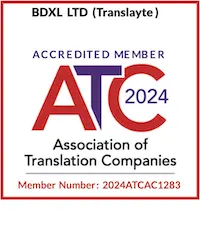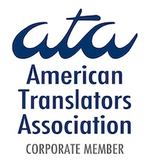Certified Translation Requirements in Austria
Foreign documents to be used for official purposes in Austria require a certified translation if they are not issued in German. A certified translation is where a court-sworn translator/interpreter certifies, with their signature and stamp, or with an affidavit, that the translation is a true and accurate reflection of the original document.
Austrian authorities are usually strict about the documents you are allowed to include as part of your application and may insist, in most instances, that you include a certified translation for all foreign documents that are not in German.
While Austrian citizens who want to visit a foreign country for education or business need to confirm what the certified translation requirements are in the country of their destination. They can go ahead with legalizing their necessary original documents. If the destination country does not have a specific certified translation requirement like USCIS translation, they can hire a certified translator in Austria.
What Exactly is a Certified Translation in Austria?
A certified translation is when a document is translated by a court-certified legal interpreter or a translator who is authorized either by an Austrian court to provide translations. Depending on the location, translators are called differently. For example, in Germany, they are called ‘Sworn translators’, while in the UK, they are called 'Certified translators’.
Furthermore, a certified translation in Austria is where a certified legal interpreter (Gerichtsdolmetscherliste), authorised by the Austrian Ministry of Justice, provides a word-for-word literal translation of the original document and includes an accompanying signed and sealed statement attesting that the translation is complete and accurate.
The certification from the translator is usually in the form of a written statement included with the translated documents and delivered to you as an electronic PDF file (any other file format you prefer) or shipped to you as a physical copy. You can then submit it along with the original documents and their translated version as part of your visa, residence permit or academic application.
Using a Certified Translator in Austria
To become a certified translator in Austria, a translator needs to be certified by an Austrian court and authorised by the Austrian Ministry of Justice. To take it a step further, the translator can also become a member of the Austrian Association of Certified Court Interpreters and Translators (ÖVGD). The OVGD is the only professional association for translators in Austria and serves as a contact point for the Ministry of Justice on all translation-related matters. Membership of the OVGD is completely voluntary and translators can become a member by paying a fee.
A translation produced by a certified legal interpreter/translator must be stamped and signed and include a photocopy of your original document with its stamp on it. Translations produced by sworn translators are accepted as-is, without any further need for an affidavit.
Translayte works with hundreds of certified legal interpreters/translators in Austria who can translate from over 60 languages into German and can help produce acceptable translations for your application.
Which Document Requires Certified Translation in Austria?
Here are some documents that require certified translation in Austria:
- Birth certificate
- Marriage certificates
- Death certificates
- Certificate of no Impediment & Nulla Ostas
- Criminal records
- Contracts
- Driving licenses
- IMTI declarations
- Divorce sentences
- Reports and medical documents
- Financial information
- Invoices
- Academic document
Where Certified Translations are Required in Austria
For translations to be used in another country, you may be asked to obtain an Apostille (for countries that are part of the Hague Convention) on the original document or obtain a certified translation from a translator in the destination country.
Translayte produces certified, notarized, sworn, and legalized translations that are accepted globally and can ensure your translations are produced accurately and accepted in the country where you intend to use them.
Translayte can provide certified translations that are accepted by any of the following agencies and organizations in Austria:
- Bundesministerium für Inneres (BMI): The Ministry of the Interior is responsible for public security, law and order, and the protection of the country's borders. certified translations may be required for documents related to immigration, naturalization, and citizenship.
- Österreichisches Staatsarchiv: The Austrian State Archives are responsible for preserving and providing access to historical documents related to the country's history. certified translations may be required for historical documents and records.
- Gerichtshöfe des öffentlichen Rechts: Public law courts are responsible for resolving disputes between individuals and the government. certified translations may be required for legal documents, such as court orders, judgments, and legal contracts.
- Österreichische Agentur für Gesundheit und Ernährungssicherheit (AGES): The Austrian Agency for Health and Food Safety is responsible for protecting public health and ensuring food safety. Certified translations may be required for documents related to health and medical reports.
- Universitäten und Fachhochschulen: Austrian universities and colleges may require certified translations of educational documents, such as diplomas, transcripts, and academic certificates.
Certified Translation in Other Countries
A document that has been certified & translated in Austria is not automatically valid in other countries. This is assuming that the destination country does not have its own strict translation requirements. If you need you need to submit your document in a foreign country, then an additional authentication or apostille is required. The Federal Ministry for European & International Affairs is responsible for issuing Apostilles in Austria.
Data Security and Confidentiality
At Translayte, we understand the importance of protecting your sensitive information and maintaining confidentiality throughout the translation process. To ensure the security of your data, we have implemented stringent data protection measures, including:
- Secure file transfer protocols and encrypted communication channels for sharing documents and information
- Rigorous confidentiality agreements signed by all our certified translators and staff members
- Regular security audits to identify potential vulnerabilities and ensure compliance with the latest data protection regulations
We are committed to safeguarding your personal and business data, providing you with peace of mind while using our certified translation services.















 Austria
Austria Belgium
Belgium Brazil
Brazil Poland
Poland Portugal
Portugal Switzerland
Switzerland Turkey
Turkey UAE / Dubai
UAE / Dubai Bulgaria
Bulgaria








